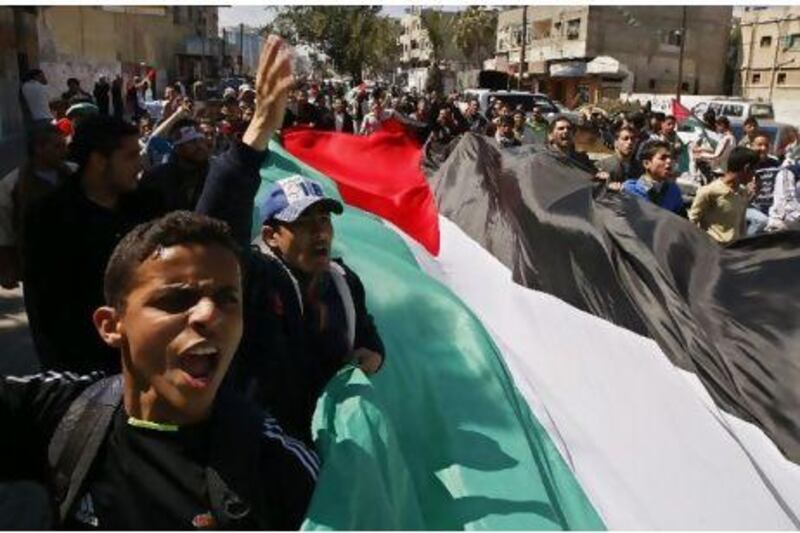RAMALLAH // Thousands of Palestinians gathered in the streets of the West Bank and Gaza Strip yesterday to demand that their leaders end their often bitter quarrel that has divided the Palestinian people between two rival governments.
Their pleas were heard more swiftly than the protesters had reason to expect, as Ismail Haniyeh, the Hamas prime minister, asked Mahmoud Abbas, the Fatah chief and president of the Palestinian Authority, to join him in the talks.
"I invite the president, brother Abu Mazen [Mr Abbas], and Fatah to an immediate meeting here in Gaza or in any location which we agree upon, to start national dialogue in order to achieve reconciliation," Mr Haniya said in a televised speech yesterday afternoon.
Not to be outdone in efforts to show who was more responsive to the desires of the Palestinian people, Mr Abbas said he was in favour of "going back to the people to put an end to the divisions through presidential and parliamentary elections." The balloting should be "as soon as possible," he said during talks with the president of Cyprus, Demetrius Christofias, in Ramallah.
It was not immediately clear whether the comments by Mr Abbas were an official response to the Hamas offer. Nor was it clear whether the Palestinian Authority president was proposing that the date of elections, already announced for September, be moved up. Officials in the office of the Palestinian president could not be reached for comment.
All efforts at mending the feud between the two most powerful Palestinian political factions have failed since the Islamist group wrested control of the Gaza Strip from Fatah forces in 2007.
Yesterday's demonstrations were organised using Facebook by a loose coalition of young activists who said they have no political affiliation.
In Gaza City, up to 10,000 people converged at the Square of the Unknown Soldier waving Palestinian flags. Brandishing Hamas's green-and-white flag and shouting Islamist slogans, supporters of the Islamist group also came, despite the organisers' stated objective of maintaining political neutrality.
Tension between the protesters and Hamas officials have run high in the run-up to the so-called March 15 demonstrations. Protest organisers have complained of police harassment and periodic detention by Hamas security agents, who urged the youth to cancel their rallies. Hamas officials could not be reached for comment yesterday.
Rallies in the West Bank city of Ramallah were small but much more jubilant yesterday, with several thousand people gathering in Manara Square. Palestinian security forces fanned out across the city and surrounded the square but did not intervene directly in the gathering.
Speakers blared songs by the Lebanese pop singer Fairuz and large banners stretched across the square reading, "The people want an end to disagreement."
Talal Taleb, 24, a business owner from Ramallah, said more than 100,000 people had signed up for a Facebook group advocating national reconciliation. "All these people have come here because they want to act as one hand again, so that we can stand up against our real enemy, Israel," he said, adding: "The people will stay here until something happens."
Amid discussion about a possible lengthy sit-in and a hunger strike, at least a dozen people slept in the roundabout on Monday night.
Since the upheavals in the Arab world started in December, political pressure on Palestinian officials has escalated.
In the West Bank, the PA leadership has come under heavy scrutiny after the television network Al Jazeera disclosed a series of embarrassing diplomatic memoranda. While they were shown offering deep concessions during recent peace negotiations, building Israeli settlements has continued following a refusal last September by Israel's prime minister, Benjamin Netanyahu, to extend a partial moratorium on such construction.
Dina Azzoumi, 16, a student at the Ramallah Friends School, came to the demonstrations with dozens of her classmates. They did not speak about elections or talks, only of a united Palestinian leadership, with or without political factions.
"We don't need Hamas and we don't need Fatah," she said. "What we need is to stay together so we can end the occupation."
hnaylor@thenational.ae
*With additional reporting from Agence France-Presse and the Associated Press





